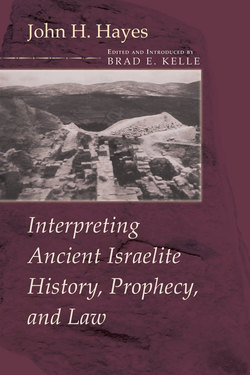Interpreting Ancient Israelite History, Prophecy, and Law

Реклама. ООО «ЛитРес», ИНН: 7719571260.
Оглавление
John H. Hayes. Interpreting Ancient Israelite History, Prophecy, and Law
Interpreting Ancient Israelite. History, Prophecy, and Law
Preface
Introduction
Abbreviations
1. The History of the Study of Israelite and Judean History
2. Wellhausen as a Historian of Israel
3. The Twelve-Tribe Israelite Amphictyony
4. The Final Years of Samaria (730–720 BC)
5. The History of the Form-Critical Study of Prophecy
6. The Usage of Oracles against Foreign Nations in Ancient Israel
7. Amos’s Oracles against the Nations (1:2—2:16)
8. Restitution, Forgiveness, and the Victim in Old Testament Law
9. Covenant
10. Covenant and Hesed
Acknowledgments
Отрывок из книги
John H. Hayes
Edited and Introduced by
.....
Before leaving this section, a few comments should be made about Jewish historiography in the Middle Ages. The surprising factor is that nothing comparable to Christian and Muslim historiography existed in Judaism during this period.70 The primary concerns of medieval Judaism centered upon either halakhic or philosophical-ethical matters. When they appear, historical matters in the Talmud are anecdotal. When the Jewish authorities “discussed the past, particular incidents, rather than its totality, caught their attention.”71 It is possible to take the various writings of a Jewish scholar like Maimonides (1135–1204) and distill from these his comments on and interpretations of various historical events reported in the Bible.72 These are basically retelling, with commentary, of the biblical narratives supplemented by haggadah and chronological notations. From these it is possible to reconstruct Maimonides’s historical worldview, but this is hardly historiography.
One special work deserves mention. This is the Hebrew writing called Josippon, so named because of its association with Josephus. Written in southern Italy in the mid-tenth century, Josippon begins with the table of nations in Genesis 10, contains a discussion of the founding of Rome, and provides a history of the Jews, primarily of the second temple period down to the fall of Masada. The unknown author made use of the Latin version of most of the books in Josephus’s Antiquities and a Latin adaptation of Josephus’s War. The book was widely used in the Middle Ages, was even translated into Arabic in the eleventh, and apparently was supplemented in the twelfth century.73
.....